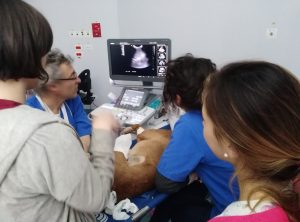Rifampicin treatment of canine pyoderma due to multidrug-resistant meticillin-resistant staphylococci: a retrospective study of 32 cases
De Lucia M, Bardagi M, Fabbri E, Ferreira D, Ferrer L, Scarampella F, Zanna G, Fondati A.
Rifampicin treatment of canine pyoderma due to multidrug-resistant meticillin-resistant staphylococci: a retrospective study of 32 cases
Vet Dermatol. 2016 Dec 26. doi: 10.1111/vde.12404
Richiedi l’articolo al’autore
Abstract
BACKGROUND: Rifampicin has received increased interest in veterinary dermatology because of its activity against multidrug-resistant meticillin-resistant staphylococci (MRS). There is limited knowledge about the efficacy and safety of rifampicin in dogs.
HYPOTHESIS/OBJECTIVE: To provide information on response to treatment and adverse effects in dogs treated with rifampicin for multidrug-resistant MRS pyoderma.
ANIMALS: Thirty two dogs treated with rifampicin for rifampicin-susceptible multidrug-resistant MRS pyoderma.
METHODS: Retrospective review of medical records, including alanine aminotransferase (ALT) and alkaline phosphatase (ALP) serum activity levels and total bilirubin concentrations, obtained before and throughout the treatment, was performed.
RESULTS: Oral rifampicin as sole systemic antimicrobial therapy (median dose 5 mg/kg twice daily) was effective in 71.88% of cases. Topical antimicrobials were used in most cases. Median duration of rifampicin treatment was five weeks for superficial pyoderma and four weeks for deep pyoderma. Gastrointestinal signs were reported in 15% of treated dogs. Statistically significant increases of ALT (P = 0.045) and ALP (P = 0.0002) values after 3-4 weeks of treatment was observed. The median increase was equal to 0.3 and ×1.5 the upper limit of the reference ranges for ALT and ALP, respectively.
CONCLUSIONS/CLINICAL IMPORTANCE: Oral rifampicin combined with topical antimicrobials can be considered an effective therapeutic option for canine superficial and deep pyoderma caused by rifampicin-susceptible multidrug-resistant MRS. Liver enzyme induction might be the most important cause of ALT and ALP increase associated with rifampicin therapy in dogs.






 Il Direttore Sanitario Dott. Marco Caldin
Il Direttore Sanitario Dott. Marco Caldin